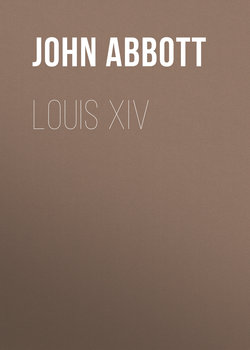Louis XIV

Реклама. ООО «ЛитРес», ИНН: 7719571260.
Оглавление
Abbott John Stevens Cabot. Louis XIV
PREFACE
Chapter I. Birth and Childhood
Chapter II. The Boy-King
Chapter III. Matrimonial Projects
Chapter IV. The Marriage of the King
Chapter V. Festivities of the Court
Chapter VI. Death in the Palace
Chapter VII. The War in Holland
Chapter VIII. Madame de Maintenon
Chapter IX. The Revocation of the Edict of Nantes
Chapter X. The Secret Marriage
Chapter XI. Intrigues and Wars
Chapter XII. The Last Days of Louis XIV
Отрывок из книги
Louis XIII. of France married Anne of Austria on the 25th of November, 1615. The marriage ceremony was performed with great splendor in the Cathedral of Bordeaux. The bride was exceedingly beautiful, tall, and of exquisite proportions. She possessed the whitest and most delicate hand that ever made an imperious gesture. Her eyes were of matchless beauty, easily dilated, and of extraordinary transparency. Her small and ruddy mouth looked like an opening rose-bud. Long and silky hair, of a lovely shade of auburn, gave to the face it surrounded the sparkling complexion of a blonde, and the animation of a brunette.1
The marriage was not a happy one. Louis XIII. was not a man of any mental or physical attractions. He was cruel, petulant, and jealous. The king had a younger brother, Gaston, duke of Anjou. He was a young man of joyous spirits, social, frank, a universal favorite. His moody, taciturn brother did not love him. Anne did. She could not but enjoy his society. Wounded by the coldness and neglect of her husband, it is said that she was not unwilling, by rather a free exhibition of the fascinations of her person and her mind, to win the admiration of Gaston. She hoped thus to inspire the king with a more just appreciation of her merits.
.....
Thus the court of the baby-king was quite imposing. From his earliest years he was accustomed to the profoundest homage, and was trained to the most rigid rules of etiquette. The dauphin early developed a fondness for military exercises. Very eagerly he shouldered the musket, brandished the sword, and beat the drum. The temperament of his brother Philip, the duke of Anjou, was very different: he was remarkably gentle, quiet, and affectionate. Gradually the baby-court of the dauphin was increased by the addition of other lads. The young king was the central luminary around whom they all revolved. By them all the dauphin was regarded with a certain kind of awe, as if he were a being of a superior, almost of a celestial race. These lads were termed "children of honor." They always addressed the king, and were addressed in return, with the formality of full-grown men. One day a little fellow named Lomenie delighted the king with a gift. The king was amusing himself with a cross-bow, which for the time being happened to be in special favor. He loaned the bow for a few moments to Lomenie. Soon, however, anxious to regain the valued plaything, he held out his hand to take it back. His governess, the Marchioness de Senecey, said to him, aside,
"Sire, kings give what they lend."
.....